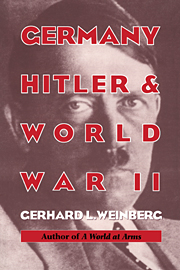Book contents
- Frontmatter
- Contents
- Preface
- Introduction
- Part I Background
- Part II The Nazi system
- Part III Background for war
- Part IV World War II
- 12 German diplomacy toward the Soviet Union
- 13 The Nazi–Soviet pacts of 1939: A half century later
- 14 From confrontation to cooperation: Germany and the United States, 1917–1949
- 15 Pearl Harbor: The German perspective
- 16 Global conflict: The interaction between the European and Pacific theaters of war in World War II
- 17 The “Final Solution” and the war in 1943
- 18 July 20, 1944: The German resistance to Hitler
- 19 D-Day after fifty years: Assessments of costs and benefits
- 20 German plans for victory, 1944–1945
- 21 Reflections on running a war: Hitler, Churchill, Stalin, Roosevelt, Tojo
- 22 Some thoughts on World War II
- 23 A new Germany in a new world
- Appendix: the end of Ranke's history? Reflections on the fate of history in the twentieth century
- Index
14 - From confrontation to cooperation: Germany and the United States, 1917–1949
Published online by Cambridge University Press: 05 August 2012
- Frontmatter
- Contents
- Preface
- Introduction
- Part I Background
- Part II The Nazi system
- Part III Background for war
- Part IV World War II
- 12 German diplomacy toward the Soviet Union
- 13 The Nazi–Soviet pacts of 1939: A half century later
- 14 From confrontation to cooperation: Germany and the United States, 1917–1949
- 15 Pearl Harbor: The German perspective
- 16 Global conflict: The interaction between the European and Pacific theaters of war in World War II
- 17 The “Final Solution” and the war in 1943
- 18 July 20, 1944: The German resistance to Hitler
- 19 D-Day after fifty years: Assessments of costs and benefits
- 20 German plans for victory, 1944–1945
- 21 Reflections on running a war: Hitler, Churchill, Stalin, Roosevelt, Tojo
- 22 Some thoughts on World War II
- 23 A new Germany in a new world
- Appendix: the end of Ranke's history? Reflections on the fate of history in the twentieth century
- Index
Summary
Over the years from 1933 to 1949 German–American relations fluctuated more violently than before or since. The inheritance of those fluctuations is still with us. In tracing the dramatic events of those years, I shall combine two approaches: broad interpretive generalization and specific details of recent scholarship.
From a low point in World War I, as well as at and after the peace conference, German–American relations improved steadily in the 1920s. At the beginning of the 1930s, it could be said that no two major powers had fewer difficulties and worked better with each other than the United States and Germany. In the United States, reaction against participation in the war, doubts about the peace settlement, hopes for the success of Germany's experiment in democracy, growing economic ties, and interest in some circles in the cultural experimentation identified with Weimar Germany made for a generally pro-German view of European affairs. In Germany, appreciation of past support for revisions of the peace settlement, hope for more of the same, and less friction than in Germany's relations with most other countries made the United States appear as a benevolent if distant associate in world affairs. This situation would change rapidly after Hitler came to power in Germany.
The economic crisis in the United States kept most Americans from following the details of the last years of the Weimar Republic, a neglect that contributed to the shock produced by the widely reported, extraordinary events surrounding the advent of the new regime in Germany.
- Type
- Chapter
- Information
- Germany, Hitler, and World War IIEssays in Modern German and World History, pp. 182 - 193Publisher: Cambridge University PressPrint publication year: 1995



